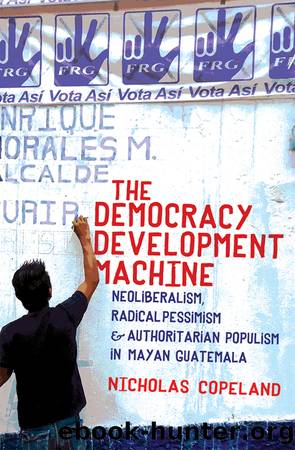The Democracy Development Machine by Nicholas Copeland

Author:Nicholas Copeland [Copeland, Nicholas]
Language: eng
Format: epub
Tags: Social Science, Anthropology, Cultural & Social, History, Latin America, Central America, Developing & Emerging Countries
ISBN: 9781501736070
Google: GMCIDwAAQBAJ
Publisher: Cornell University Press
Published: 2019-05-15T04:27:57+00:00
The Radical Organization of Pessimism
In an essay on the politics of poetry, Walter Benjamin (1999 [1929]) distinguishes the âabsoluteâ pessimism informed by the surrealist profane illumination of bourgeois freedom and everyday life from the optimistic imagery that unites bourgeois and socialist poetics. He calls for an âorganization of pessimism,â with pessimism defined as follows:
Mistrust in the fate of literature, mistrust in the fate of freedom, mistrust in the fate of European humanity, but three times mistrust in all reconciliation: between classes, between nations, between individuals. And unlimited trust only in ⦠the peaceful perfection of the air force. (217â18)
Only pure pessimism, he wrote, could âexpel moral metaphor from politicsâ and replace contemplation and âmetaphysical materialismâ with direct âcontact with the proletarian masses,â an encounter that changes circumstances rather than attitudes. He imagined surrealist art as a technology designed to make âbody and image so interpenetrate that all revolutionary tension becomes collective innervation, and all the bodily innervations of the collective become revolutionary dischargeâ (56). He continues:
The collective is a body, too. And the physis that is being organized for it in technology can, through all its political and factual reality, only be produced in that image sphere to which profane illumination initiates us.
Rural Mayas do not lack for âinnervationâ or profane illumination; mistrust of powerful and interlinked forces is a deeply engrained habit of social and political perception rooted in countless experiences of abjection. Rather than incite revolt, as it did in the 1960s and 1970s, this profane illumination is more often suffocated by repressive violence that generates pessimism about the very possibility of liberatory collective action. The affective force of violence overwhelms reactions against suffering and injustice by insisting that resistance only brings worse pain. But these reactions do not simply disappear; they remain a source of tension and conflict, and they continue to build, even though some individuals have found relief through market advancement. Many bottle up their frustrations in stress and worry; others prey on those more vulnerable. Systematic targeted violence clamps down the lid on the pressure cooker that is Guatemalan society, but it is not enough on its own to stop the eruptions, signs of which are everywhere.
Authoritarian organizations of pessimism through neoliberal democracy and development channel frustration with everyday violence and defeat into movements for the continuation of the political order.32 In the following chapters I describe how electoral politics and authoritarian populism achieve this outcome. By contrast, the radical organization of pessimism channels frustration with suffering and exclusion into political movements to dismantle the structures that produce them and to create more-just and more-inclusive social arrangements. In Guatemala these structures are the liberal (and now neoliberal) economy and the Ladino state, the former systematically dispossessing and exploiting indigenous and poor people, the latter gracing this misery with the stamp of legality and excluding Mayas from positions of power (Cojtà 2007). Both were founded on violence and require violence to persist. Many Mayan Sampedranos, like many other poor and indigenous Guatemalans, fought for redistributive social democracy and suffered the consequences.
Download
This site does not store any files on its server. We only index and link to content provided by other sites. Please contact the content providers to delete copyright contents if any and email us, we'll remove relevant links or contents immediately.
Cat's cradle by Kurt Vonnegut(15339)
Pimp by Iceberg Slim(14489)
4 3 2 1: A Novel by Paul Auster(12377)
Underground: A Human History of the Worlds Beneath Our Feet by Will Hunt(12090)
The Radium Girls by Kate Moore(12019)
Wiseguy by Nicholas Pileggi(5771)
The Fire Next Time by James Baldwin(5432)
Perfect Rhythm by Jae(5398)
American History Stories, Volume III (Yesterday's Classics) by Pratt Mara L(5301)
Paper Towns by Green John(5180)
Pale Blue Dot by Carl Sagan(4996)
A Higher Loyalty: Truth, Lies, and Leadership by James Comey(4954)
The Mayflower and the Pilgrims' New World by Nathaniel Philbrick(4495)
The Doomsday Machine by Daniel Ellsberg(4485)
Killers of the Flower Moon: The Osage Murders and the Birth of the FBI by David Grann(4443)
The Sympathizer by Viet Thanh Nguyen(4385)
Too Much and Not the Mood by Durga Chew-Bose(4338)
The Borden Murders by Sarah Miller(4314)
Sticky Fingers by Joe Hagan(4188)
